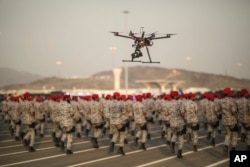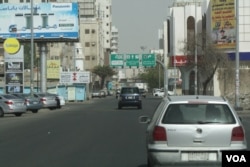Relations between Iran and Saudi Arabia - tenuous at best since the 1979 Iran revolution - have plummeted in the wake of an international nuclear deal with Iran and Saudi Arabia’s execution of a prominent Shi'ite cleric in January. The two rivals have mended explosive rifts in the past, and some analysts say it’s time they mend the current one, lest they ignite a direct war that could swallow the whole region.
Détente is the better option, said Jean-François Seznec, senior fellow in the Atlantic Council’s Global Energy Center and an expert on the political economy of Gulf states.
“I would argue that having low oil prices is making life much more difficult for both Saudi Arabia and Iran,” he said. “They have huge demands on their treasuries. The Saudis have a lot of cash on hand and can last longer, but if there were a major military conflagration, it would ruin both of them, and I think they realize that.”
Saudi Arabia has another reason to mend fences with Iran: For all its boasting , its military isn’t up to war with Iran.
“The Saudis have spent $700 billion over the past 20 years or so building up their military, and the U.S. has been training the Saudis for fifty years,” said Seznec. “But their military structure until lately was very poor, just a way for various clans to show off their toys, but not necessarily to defend the country.”
Furthermore, the booming shale industry in the U.S. means America is not as dependent on Middle East oil imports and unlikely to help out.“The U.S. is less interested in losing people and money to defend countries which have less interest, in terms of economics,” he said.
Iranian overture?
But Iran can ill afford any further military adventures, after years of conflict, tough sanctions, and the drop in oil prices, Seznec also points out.
“Iran is really close, I think, to the brink of bankruptcy," he said. "The only way for their economy to improve would be to work with the Saudis to bring up the price of oil a little bit, which can only happen with Saudi effort and Saudi help.”
Iran's predicament may explain a recent report in Kuwait media. It said that Iran’s intelligence minister recently visited Kuwait with a written message from the Iranian president, looking for “quiet dialogue” toward settling issues with the Gulf Cooperation Council (GCC) and restarting relations with Gulf Arab countries – read, Saudi Arabia.
Kuwait asked for Iran to “lift custodianship” of Shi'ites in Gulf and Arab countries as a “confidence-building measure,” some media reports say. While GCC members are reported to be considering the overture, sources say Riyadh is not likely to make any official response.
The problem of Syria
Iran, however, will not do what Saudi Arabia really wants it to do, that is, withdraw from Syria, says Nader Hashemi, Director of the Center for Middle East Studies at the University of Denver’s Josef Korbel School of International Studies.
“They are in Syria for reasons that have very little to do with sectarian theology and everything to do with Iran’s national security doctrine, its competition for regional hegemony with the Saudis and primarily its access to Hezbollah,” said Hashemi. “And Iran knows that if the Assad regime falls, the successor regime is going to be deeply antagonistic to Iran, very sympathetic to the Saudis, and that would be a game changer in terms of Iran’s influence in the region.
This statement only supports Saudi Arabia’s narrative.
“The Saudis view Iran not just as the main threat to their own security, but they also see it as the primary cause of the tumult that has gripped the region over the past few years. They maintain that Iran has a pattern of supporting militant Shia groups that want to oppose their will on their respective countries, with the Lebanese Hezbollah being the prime example,” said Fahad Nazer, a political analyst with JTG, Inc. and former political analyst at the Saudi embassy in Washington, D.C.
This week, the U.N. announced that warring parties in Yemen have agreed to a ceasefire and renewed peace talks. Could this have any impact on the “Cold War” between Saudi and Iran?
“It will certainly help diffuse tensions between Tehran and Riyad, but it is not a game changer,” said Hashemi.
Nazer is equally doubtful.
“Bringing the bloodshed in Syria to an end is an even bigger priority for Saudi Arabia than is stabilizing Yemen,” he said. “The Saudis view the war in Syria as an era-defining conflict that could have long term repercussions for the entire region for years to come.”






